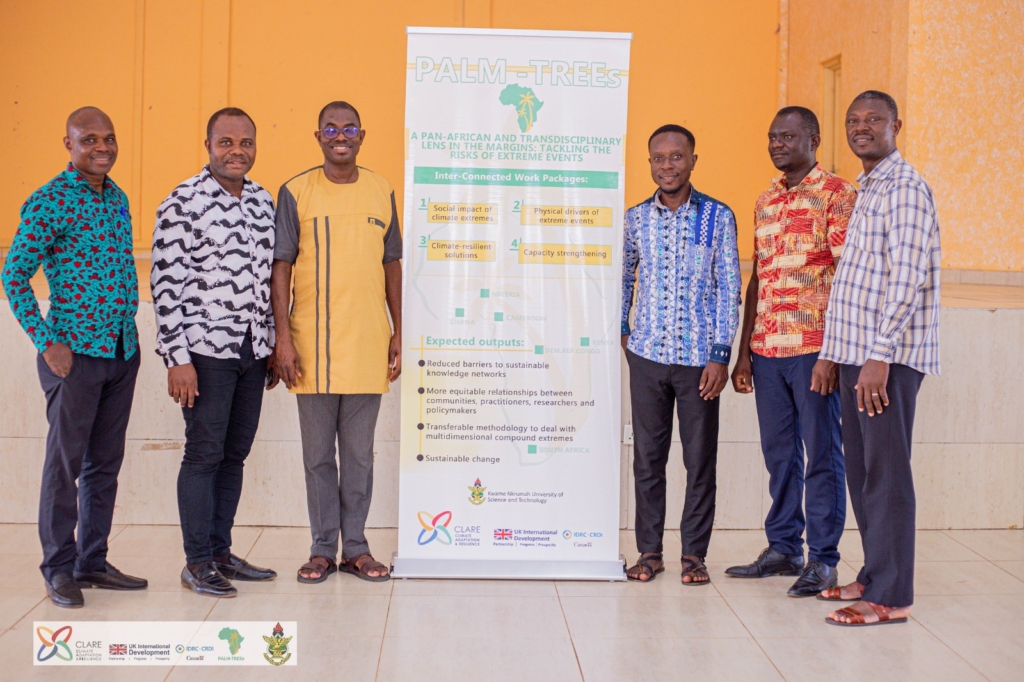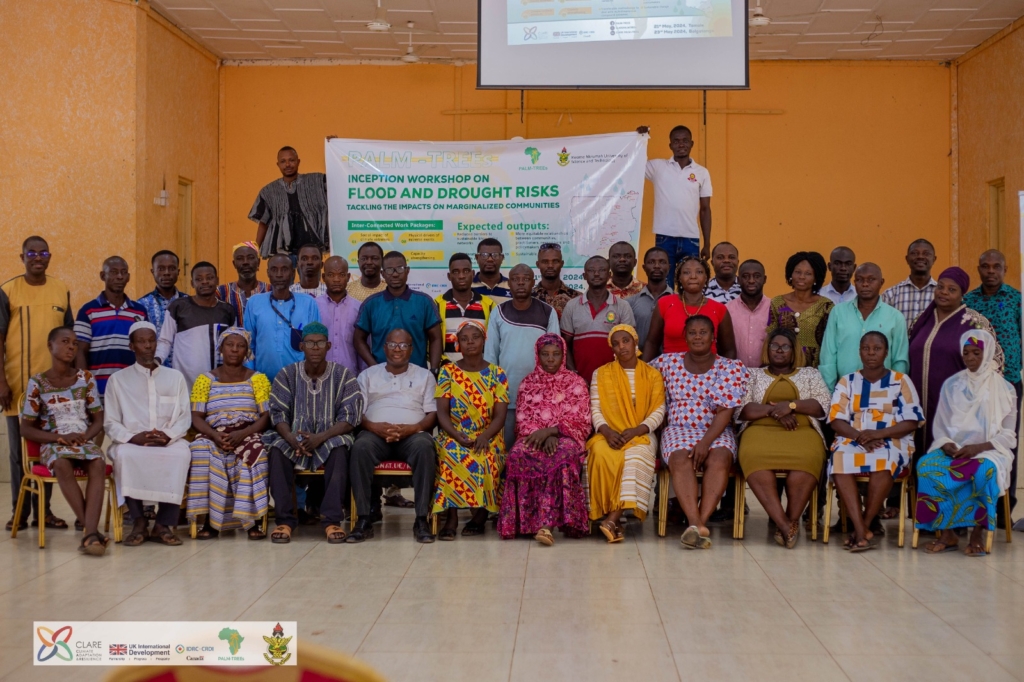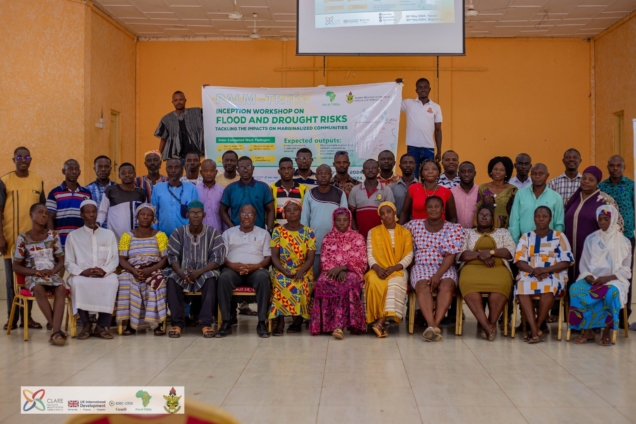The Pan-African and Transdisciplinary Lens in the Margins: Tackling the Risks of Extreme Events (PALM-TREEs) project has begun.
The project aims to integrate local knowledge and community needs into disaster preparedness and adaptation plans in the White Volta basin.
The project will engage with stakeholders and communities in 30 areas across four regions in Northern Ghana including Savannah, Northern, North East and Upper East regions to address the impacts of floods and droughts on marginalized communities.
The goal is to foster equitable relationships between communities, practitioners, researchers, and policymakers, promoting sustainable change and knowledge sharing to tackle complex extreme events.
During the inception workshop held in Tamale and Bolgatanga, over 60 residents from across the four regions gathered to share their experiences and insights, providing new perspectives and building on existing knowledge about floods and droughts.

Farmer and residents share experiences
Abdallah Saaka from Zantani and Iddrisu Abubkari Zakari from Wala in the Northern region have experienced extreme weather conditions, with Abdallah facing devastating floods and Iddrisu struggling with prolonged drought.
The floods have destroyed the local bridge, isolating communities and washing away crops, causing immense damage. Abdallah described the impact as "great and unimaginable".
Meanwhile, Iddrisu's community has been waiting for rainfall, but it has been scarce and unpredictable, forcing residents to abandon their farms and seek alternative livelihoods.
In September and October 2020, floods destroyed his 500 acres of maize and rice fields in the Upper East Region. Ariku Martin Akudugu was left devastated at home wondering how to start all over again.
“It was the worst flood ever since I started farming. The 2012 incident was better," said the 1st runner-up in the 2016 National Best Farmer Awards, who lives at Kobore in the Bunduri district.
“The flood destroyed everything, and we couldn't salvage a single plant,” he said.
The flood was caused by the Bagre dam spillage in Burkina Faso and the heavy downpour experienced between September and October 2020.
PhD students focus areas of research & significance
At the inception workshop, three PhD students from the Department of Meteorology and Climate Science at KNUST, Samuel Owusu Ansah, Joshua Asamoah, and Alfred Awuah, presented their research on floods, drought, and their impacts on livelihoods, highlighting the significance of addressing these topics.

Joshua Asamoah, who is working on a project assessing drought impacts on marginalized communities in the White Volta basin, emphasized the need to quantify and understand drought intensity, frequency, and duration, as well as identify its drivers.
He noted that drought data is scarce in the area due to limited research, making it challenging to provide accurate information. The research aims to understand the impacts of drought on marginalized communities and identify strategies to enhance their resilience.
Samuel's research focuses on the impacts of floods on vulnerable communities in the White Volta basin, a crucial area of study that has been overlooked in the past.
While previous research has primarily concentrated on the physical and social science aspects of floods, Samuel's work takes a more comprehensive approach by examining not only the physical and social science aspects but also the human impact of these extreme events on marginalized communities.
By addressing this knowledge gap, Samuel's research aims to provide a more complete understanding of the effects of floods on vulnerable populations.
"I am interested in the most vulnerable people because these are the most impacted," he said.
Alfred's research explores the effects of both floods and droughts on the livelihoods of people residing within the White Volta basin. Since most of the population relies on agriculture, extreme weather events like floods and droughts result in significant crop losses, impacting their primary source of income.
Alfred emphasizes the importance of building resilience among these communities, as they have limited livelihood options and are highly vulnerable to the impacts of climate-related disasters.
Researchers develop innovative methods to enhance climate risk assessment
One of the lead researchers, Professor Thompson Annor at KNUST's Department of Meteorology and Climate Science, leads the research using a multi-method approach to create risk narratives and improve climate modeling.
The methods combine existing demographic and health surveys with new data from participatory analysis, mapping, focus groups, and multilevel modeling, as well as integrating local weather observations and satellite data.
The IPCC Sixth Assessment Report reveals that all populated regions have experienced extreme climate events, leading to unprecedented impacts, especially when multiple hazards like droughts, floods, and heatwaves coincide or occur in rapid succession, exacerbating their effects.
Professor Annor explains that the project aims to develop strategies to enhance the resilience of marginalized people, who are disproportionately affected by extreme weather events.
He notes that current interventions for drought and flood-affected communities are often short-term and inadequate, providing temporary relief but failing to address the underlying issues, which persist long after the initial support has ended.
“Most of the time when there is drought and floods, some of the interventions affected communities receive are short-lived and within a few months everything is gone and the problem still persist.”
Prof. Annor stresses the need for community cooperation, collaboration, and sharing of experiences throughout the project, to guarantee the development of effective solutions and interventions that foster resilience and benefit the communities themselves.
Latest Stories
-
Paris 2024: Opening ceremony showcases grandiose celebration of French culture and diversity
3 hours -
How decline of Indian vultures led to 500,000 human deaths
4 hours -
Paris 2024: Ghana rocks ‘fabulous fugu’ at olympics opening ceremony
4 hours -
Trust Hospital faces financial strain with rising debt levels – Auditor-General’s report
5 hours -
Electrochem lease: Allocate portions of land to Songor people – Resident demand
5 hours -
82 widows receive financial aid from Chayil Foundation
5 hours -
The silent struggles: Female journalists grapple with Ghana’s high cost of living
5 hours -
BoG yet to make any payment to Service Ghana Auto Group
5 hours -
‘Crushed Young’: The Multimedia Group, JL Properties surprise accident victim’s family with fully-furnished apartment
6 hours -
Asante Kotoko needs structure that would outlive any administration – Opoku Nti
6 hours -
JoyNews exposé on Customs officials demanding bribes airs on July 29
7 hours -
JoyNews Impact Maker Awardee ships first consignment of honey from Kwahu Afram Plains
8 hours -
Joint committee under fire over report on salt mining lease granted Electrochem
8 hours -
Life Lounge with Edem Knight-Tay: Don’t be beaten the third time
8 hours -
Pro-NPP group launched to help ‘Break the 8’
8 hours

